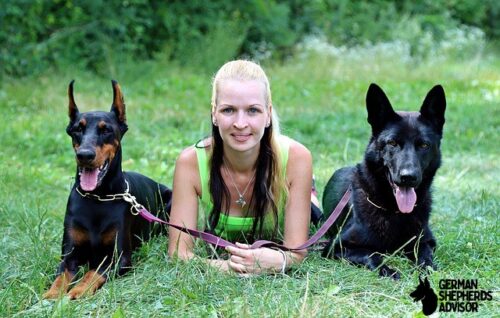German Shepherds are one of the most popular dog breeds worldwide, celebrated for their intelligence, loyalty, and versatility. Well suited as working dogs in many areas of endeavor like police work, search-and-rescue and and assistance work, they are loved as family pets as well. They are so intelligent and energetic that in the hands of a novice the dog may even become a difficult challenge if not trained and exercised well.
Training a German Shepherd is not only about teaching them commands; it is about building a bond with your dog that lasts a lifetime. In the article you will learn step by step methods on how to train your German shepherd effectively, starting with a puppy or an adult dog.
Understanding your German Shepherd
Before diving into training, it’s essential to understand the unique traits of the German Shepherd.
Temperament and traits
German Shepherds are known for their:
- High energy levels: They need regular physical and mental stimulation.
- Intelligence: They are quick learners but may also outsmart you if you’re not consistent.
- Protective instincts: Loyal to their families, they may be wary of strangers.
Why Are German Shepherds So Protective: Are They Territorial?
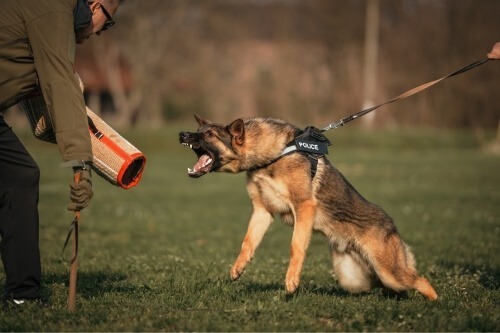
Why training is essential?
Proper training ensures your dog is:
- Well-behaved at home and in public.
- Confident and free from behavioral issues like aggression or fear.
- Happy and mentally stimulated, reducing destructive behaviors.
Why does my German Shepherd circle me: A behaviour analysis!
What should I do if my German Shepherd shows aggression during training?
If your dog exhibits aggression:
- Identify and remove triggers, such as fear or resource guarding.
- Avoid scolding; instead, use calm, assertive energy.
- Consult a professional trainer or behaviorist if aggression persists.
Why are German Shepherds Aggressive: Is It Right?
Basics of training a German Shepherd
Start early
Ideally, training begins when your dog is a puppy (8–12 weeks). Puppies are more receptive to new experiences, making it easier to instill good habits. However, even adult German Shepherds can be trained with patience.
Positive reinforcement
Reward-based training is most effective. Use treats, toys, or verbal praise to encourage desired behaviors. Avoid punishments, as they can lead to fear or aggression.
Is punishment an effective training method for German Shepherds?
No, punishment can lead to fear or aggression and damage your bond with your dog. Positive reinforcement is the most effective method for teaching and encouraging desired behaviors.
Consistency is key
Consistency in commands and routines helps your dog understand expectations. If one family member allows the dog on the couch while another scolds them, it creates confusion.
Essential commands to teach
Basic obedience
Sit: Hold a treat above your dog’s head and move it back slightly. As their head tilts up, their bottom will naturally lower. Reward and praise once they sit.
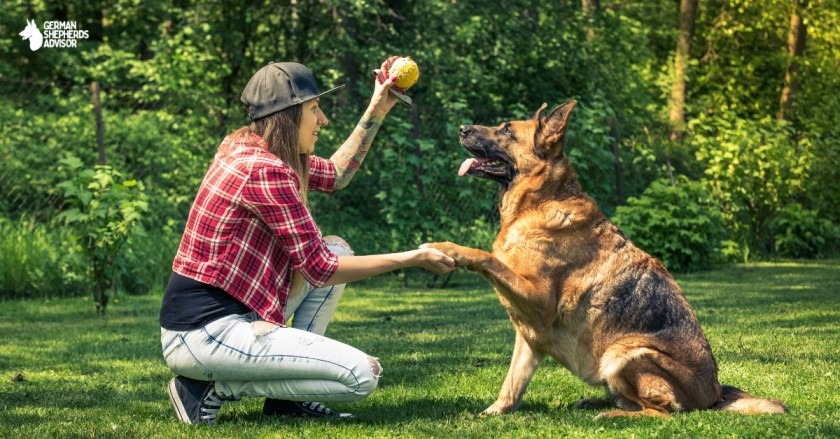
Stay: With your dog sitting, show your palm (like a stop signal) and say “Stay.” Step back a little, then reward if they remain in place.
Come: Use a cheerful tone and say, “Come,” while kneeling with open arms. Reward when they approach you.
Leash training
German Shepherds are strong and can easily pull on a leash.
Start by teaching them to walk beside you:
- Use a short leash and treats to guide them to your side.
- Stop walking if they pull, resuming only when they’re calm.
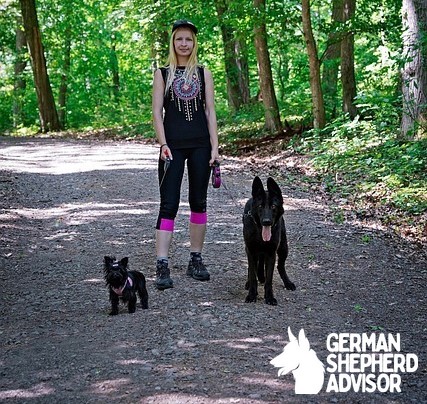
Recall training
Recall is crucial for safety. Practice in a secure, distraction-free area before introducing challenges like busy parks.
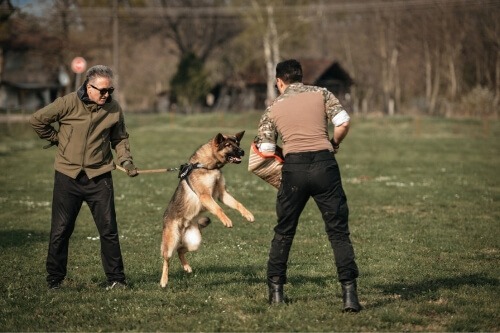
Advanced training techniques
Crate training
Crates mimic a den-like environment where your dog feels safe.
Introduce the crate gradually:
- Place treats inside and let your dog explore freely.
- Use the crate for short periods, gradually increasing the duration.
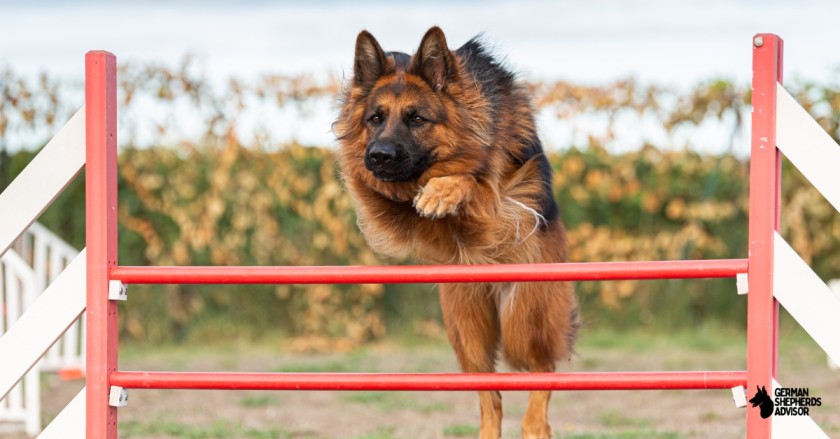
How To Stop German Shepherd From Jumping Over Fence: Pro Tips!
How High Can A German Shepherd Jump: A Debate!
Behavioural training
Address common issues like:
- Excessive barking: Identify triggers (e.g., strangers, boredom) and work on desensitizing your dog.
- Chewing: Redirect them to appropriate toys and provide plenty of mental stimulation.
Obedience beyond basics
Teach your German shepherd dog advanced commands like “Heel,” “Wait,” and hand signals. These are especially useful in high-distraction environments.
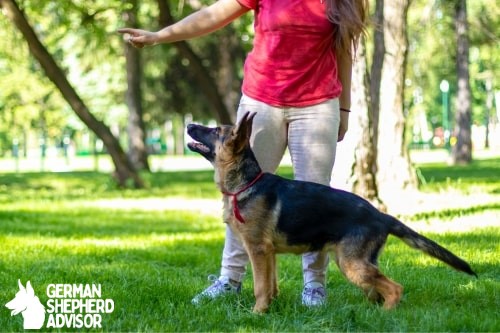
My German Shepherd barks excessively. How can I fix this?
Excessive barking often has a trigger, such as boredom, fear, or alerting behaviour.
Why does my German Shepherd bark so much: Let’s Dig in.
Address the root cause:
- Provide physical and mental stimulation to prevent boredom.
- Use commands like “Quiet” and reward calm behaviour.
- Desensitize them to triggers (e.g., strangers or noises).
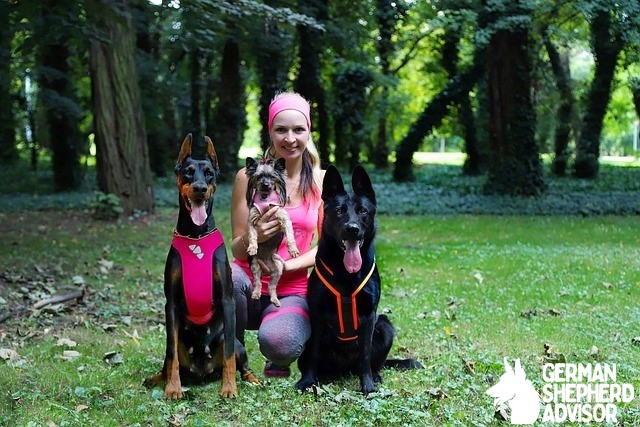
Are German Shepherds Good With Other Dogs: A Brief Study!
What are some fun tricks I can teach my German Shepherd?
Beyond basic commands, German Shepherds love learning tricks like:
- Shake hands
- Roll over
- Play dead
- Fetch specific items
- Spin
These tricks provide mental stimulation and strengthen your bond. How To Make a German Shepherd Love You? A Genuine Concern!
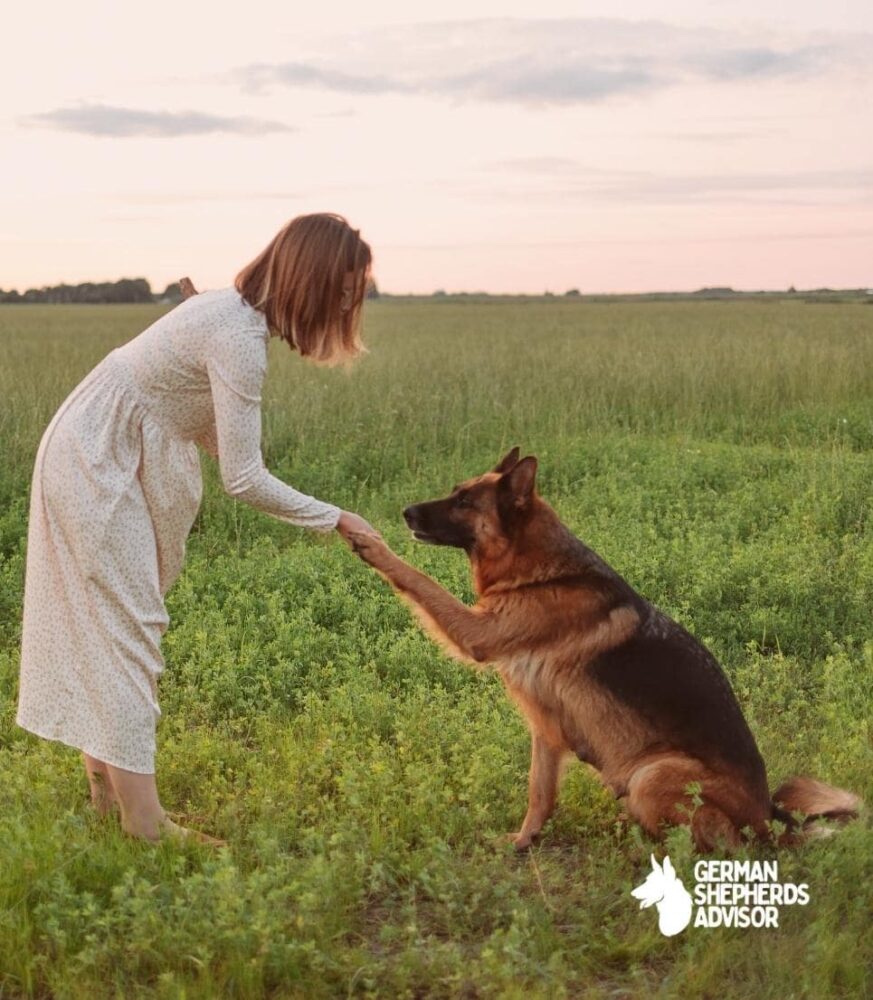
How can I ensure my German Shepherd behaves well around children?
- Teach children how to interact gently with the dog.
- Supervise all interactions, especially with young children.
- Train your dog to be calm around kids and reward gentle behaviour.
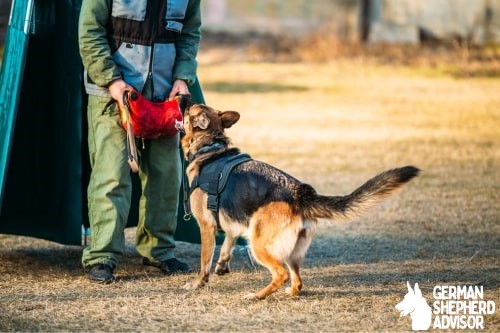
Are German Shepherds hyper? The things you need to know.
Socialization tips: German shepherd dog
Socialization is the process of exposing your dog to various people, animals, and environments to ensure they are well-adjusted and confident.
Dog-to-Dog interactions
Arrange playdates or visit dog parks. Monitor interactions to ensure positive experiences, especially with larger breeds.
People and environments
Introduce your German Shepherd to different settings, such as busy streets or quiet parks. Reward calm behavior to build positive associations.
Common training challenges
Stubbornness
If your German Shepherd seems uncooperative, assess whether they’re bored or overstimulated. Break training into short, engaging sessions.
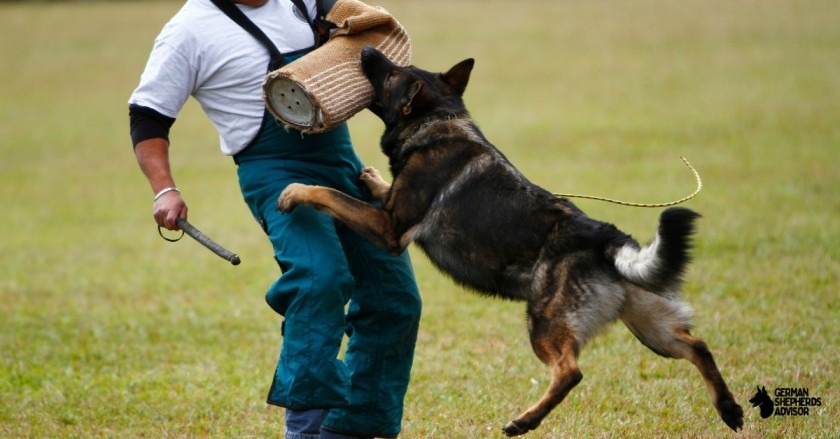
Separation anxiety and energy management
Start by leaving your dog alone for short periods, gradually increasing the time. Provide toys or treats to keep them occupied. A tired dog is a well-behaved dog. Incorporate daily walks, fetch, or agility exercises to burn excess energy.
How do I handle separation anxiety in my German Shepherd?
For separation anxiety:
- Start by leaving your dog alone for short periods and gradually increase the duration.
- Provide toys, puzzles, or treats to keep them occupied.
- Avoid dramatic exits or reunions to minimize stress.
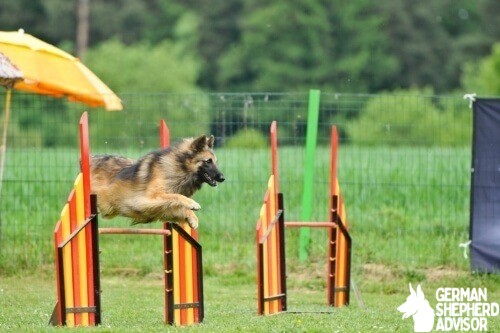
How do I teach my German Shepherd to stop chewing on furniture or shoes?
To prevent destructive chewing:
- Provide plenty of chew toys.
- Redirect your dog when they chew on inappropriate items.
- Ensure they have enough physical and mental stimulation to reduce boredom.
Tools for training
Essential tools for professional training:
- Leash and collar: A sturdy leash and a comfortable collar are a must.
- Treat pouch: Keeps rewards handy during training sessions.
- Clicker: A tool for clicker training to mark correct behaviors.
- Consider enrolling in obedience classes or working with a certified dog trainer if you face difficulties.
Should I hire a professional trainer for my German Shepherd?
If you’re struggling with training or facing behavioral issues, a professional trainer can be very helpful. Group classes or private sessions can provide personalized guidance and improve results.
How long does training take?
Training is an ongoing process. Basic obedience commands may take a few weeks, but advanced skills and behavioral adjustments can take months. Consistent reinforcement throughout your dog’s life is essential to maintain good behavior.
Tips for successful training
- Patience: Training doesn’t happen overnight. Celebrate small victories.
- Routine: Stick to a daily training schedule.
- Positive Energy: Dogs respond to your mood. Stay calm and encouraging.
What are the most important commands to teach a German Shepherd?
The essential commands include:
- Sit
- Stay
- Come
- Down
- Leave it
- Heel
These commands ensure safety and basic obedience in various situations.
How do I stop my German Shepherd from pulling on the leash?
To prevent leash pulling:
- Use a short leash and keep your dog beside you.
- Stop walking immediately if they pull and resume only when they’re calm.
- Reward them for staying at your side.
What should I do if my German Shepherd doesn’t obey commands?
If your dog isn’t responding:
- Ensure there are no distractions during training sessions.
- Use high-value treats to grab their attention.
- Stay consistent with your commands and avoid giving up too quickly.
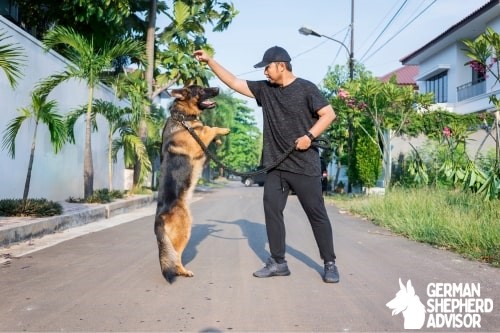
Final words
Training your German Shepherd is a rewarding journey that strengthens your bond and ensures a well-mannered companion. Start early, use positive reinforcement, and be consistent. Whether you’re teaching basic commands or advanced tricks, enjoy the process and cherish the milestones along the way.
Frequently asked questions (FAQs)
Training should begin as early as 8–12 weeks old for puppies. Early training helps establish good habits and socialization. However, adult German Shepherds can also be trained effectively with patience and consistency.
Yes, German Shepherds are highly intelligent and eager to please, making them one of the easiest breeds to train. However, their intelligence also means they can become bored easily, so training should be engaging and consistent.
Basic obedience training typically takes a few weeks with daily practice. Advanced training or addressing behavioral issues can take several months. Consistent reinforcement is necessary throughout your dog’s life.
Start socialization early by exposing your dog to various people, environments, and animals in a controlled, positive manner. Reward calm behavior and avoid overwhelming them with too much at once.
Yes, crate training is effective for German Shepherds. Use the crate as a safe space, not as punishment. Gradually introduce the crate with treats and praise to make it a positive experience.
German Shepherds require at least 1–2 hours of exercise daily. Physical activity like walks, runs, or playtime complements training by reducing excess energy and improving focus.
Absolutely! While puppies are easier to train, older dogs can learn new behaviors with consistency and patience. Training an adult dog may take longer, but it’s equally rewarding.
Yes! Mental stimulation is crucial for preventing boredom and destructive behavior. Use puzzle toys, training games, or advanced commands to challenge their minds.

